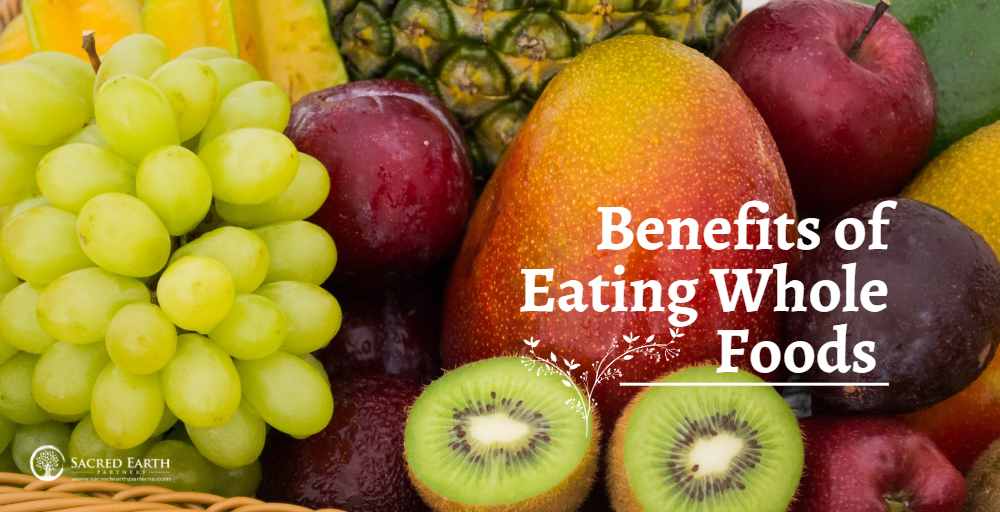
Are you tired of feeling sluggish, tired, and generally unwell? It’s time to take a closer look at your diet. Eating whole foods can have a significant impact on your health, both physically and mentally. But did you know that there are also surprising benefits that can improve your overall well-being? In this article, we’ll explore five surprising benefits of eating whole foods for a happier, healthier you. From improving your mood to boosting your immune system, you’ll be amazed at the positive effects that whole foods can have on your life. So, if you’re looking for a way to feel better, look no further than your plate. Let’s dive in and discover the benefits of eating whole foods!
What are whole foods?
Whole foods are minimally processed and contain no added sugars, fats, or salts. These are foods that are as close to their natural state as possible. Examples of whole foods include fruits, vegetables, whole grains, nuts, seeds, and legumes. These foods are rich in vitamins, minerals, fiber, and other essential nutrients vital for our bodies to function properly.
The science behind whole foods
The science behind whole foods is simple: our bodies are designed to eat whole foods. When we eat processed foods high in sugars, fats, and salts, our bodies must work harder to break them down and extract the necessary nutrients. This can lead to various problems, from digestive issues to chronic diseases. On the other hand, whole foods are easy for our bodies to digest and absorb, allowing us to get the nutrients we need without putting undue stress on our systems.
Common misconceptions about whole foods
Some common misconceptions about whole foods can make them seem unappetizing or unappealing. For example, some people believe that whole foods are bland or tasteless. However, this couldn’t be further from the truth! Whole foods can be incredibly flavorful and satisfying, especially when prepared carefully. Another misconception is that whole foods are expensive or hard to find. While it’s true that some whole foods can be pricey, there are plenty of affordable options available at most grocery stores.
The benefits of whole foods
Improved digestion
One of the most significant benefits of eating whole foods is improved digestion. Whole foods are rich in fibre, which helps to keep our digestive systems running smoothly. Fiber also helps feed the good bacteria in our guts, improving our overall gut health. This, in turn, can lead to better digestion, less bloating, and more regular bowel movements.
Increased energy levels
Another surprising benefit of eating whole foods is increased energy levels. Whole foods are rich in complex carbohydrates, broken down slowly by our bodies, providing a steady energy source throughout the day. On the other hand, processed foods are often high in simple sugars, which can cause our blood sugar levels to spike and crash, leaving us tired and lethargic.
Better mental health
Whole foods can also have a positive impact on our mental health. Studies have shown that a diet rich in whole foods can help to reduce symptoms of depression, anxiety, and other mood disorders. This is likely due to the fact that whole foods are rich in nutrients that are essential for brain health, such as omega-3 fatty acids, B vitamins, and antioxidants.
Reduced risk of chronic diseases
Eating whole foods can also help to reduce our risk of chronic diseases such as heart disease, diabetes, and cancer. This is because whole foods are rich in nutrients that are essential for our bodies to function properly, and they contain no added sugars, fats, or salts that can contribute to chronic disease risk.
Improved overall well-being
Finally, eating whole foods can improve our overall well-being in various ways. Whole foods can help us maintain a healthy weight, reduce inflammation in our bodies, and improve our immune function. They can also help us feel more satisfied and less likely to overeat, which can benefit weight management.
How to incorporate whole foods into your diet
Incorporating whole foods into your diet is easier than you might think. Start by making small changes, such as swapping processed snacks for whole food alternatives like fruit or nuts. Gradually increase the amount of whole foods in your diet, and try new recipes that feature whole food ingredients.
Delicious whole food recipes to try
Here are a few delicious whole food recipes to get you started:
- Roasted sweet potato and black bean tacos
- Quinoa and vegetable stir-fry
- Lentil and vegetable soup
- Berry and yogurt smoothie bowl
Whole food supplements and alternatives
If you’re having trouble getting enough whole foods in your diet, you may want to consider taking supplements or using whole food alternatives. For example, you can use almond flour instead of wheat flour in baking, or use coconut sugar instead of refined sugar. Just be sure to choose high-quality supplements and alternatives, and talk to your healthcare provider before making any major changes to your diet.
Conclusion
Eating whole foods can have a significant impact on your health and well-being. From improved digestion to better mental health, the benefits of whole foods are numerous and surprising. So, if you’re looking for a way to feel better and live a healthier life, start by making small changes to your diet and incorporating more whole foods into your meals. Your body will thank you!
Photo by Jonas Kakaroto on Unsplash